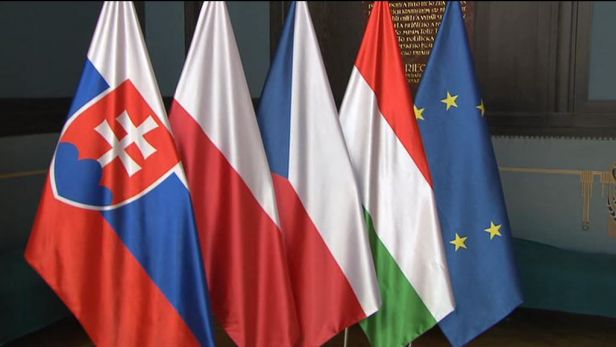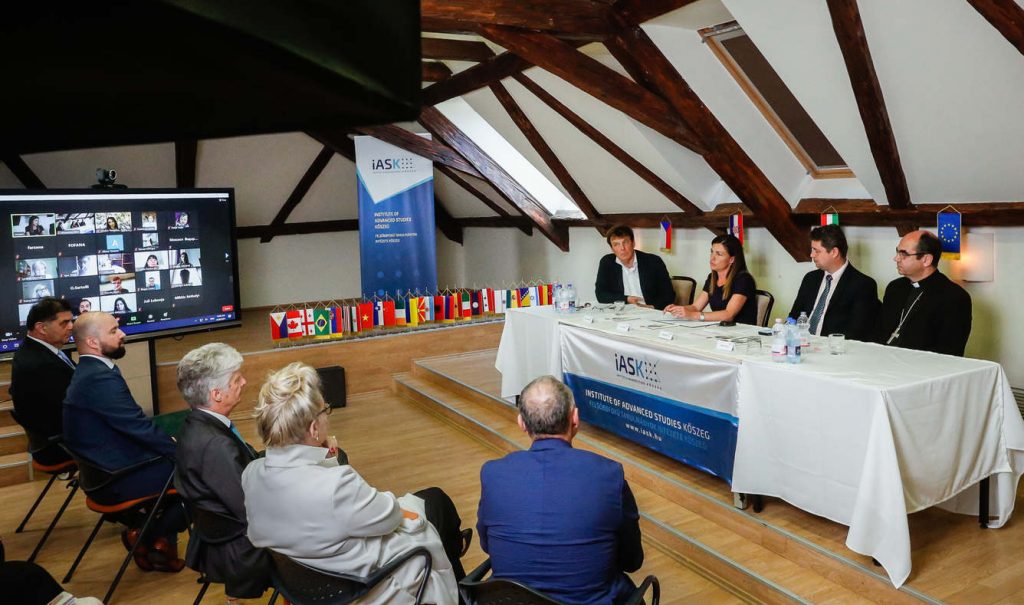Research & Studies


The 26th International Summer University, entitled “The Global “Entangoment” of Central Europe,” has started. A press conference on the opportunities of Central Europe was held after a panel discussion.
International Summer Universities have provided a venue for experts, policy-makers, researchers, social scientists and students to meet as well as discuss today’s challenges since 1996. Judit Varga, the Minister of Justice, accepted an invitation to participate on the opening day of this comprehensive debate which this year is taking place both in-person and online. Representing the host, the Institute of Advanced Studies Kőszeg, Director Professor Ferenc Miszlivetz greeted and introduced the other distinguished guests: Ambassador Katalin Bogyay, former Permanent Representative of Hungary to the United Nations; Bishop Dr. János Székely; and Béla Básthy, the Mayor of Kőszeg. Following the opening speeches, a panel discussion started between diplomats. Led by Iván Bába, former State Secretary and Ambassador in Ministry for Foreign Affairs of Hungary, contributions were heard from Mladen Andrlić, Ambassador of the Republic of Croatia to Hungary; Tibor Bial, Ambassador of the Czech Republic in Hungary; Andor Nagy, Ambassador of Hungary to Austria; and Klaus Wölfer, an Austrian diplomat.
The Minister of Justice, Judit Varga, labeled the discussion on the opportunities of Central Europe as timely, as discussions on the future of Europe also started this year. She underlined the importance of Hungary’s experiences of EU membership, which has lasted nearly two decades, in these discussions. “All the keywords that naturally bind Central European countries together in terms of their history and geography, as well as their social and political past have been heard,” she said. “Looking back on the past few years, Central European countries have demonstrated their abilities and fighting spirits in Europe. We now have to rely on these lessons and achievements to face the challenges of the post-pandemic period of recovery. The Central European region must respond to enormous challenges in the fields of digitization, infrastructure development, energy and greening. Furthermore, a once-in-a-lifetime opportunity has arisen to connect our economies – not just in terms of culture, traditions and history but also physically – as well as multiply our inherent potentials. It is paramount to build a strong Europe of strong nations where, supported by Central European integrity and decency, the European Community is set on the right path and positioned in a sincere fashion on the global markets,” she said. Ambassador Katalin Bogyay has been a member of the International Advisory Board of iASK from its conception. “Our vision and ambition have always been for the Institute to connect various cultures, peoples and universities through ideas and cooperation,” she said. According to Ambassador Bogyay, network development is also an essential message of this year’s Summer University, while the never-ending openness, diversity and multidisciplinarity of iASK represent the future.
Based on an initiative by Andor Nagy, a conference entitled “Central European Platform” will be organized on 26 November 2020, during which representatives of the Visegrad Group, namely Austria, Croatia and Slovenia, will participate. “Although the level of appreciation in connection with this region has increased, we need to outline and represent our common values,” he said.
As Iván Bába commented, “we have been a full member state of the European Union and expect to be treated like one.” Another important message of Central Europe that he mentioned is that “our train of thought is not towards the destruction of the EU but rather the reinforcement of its position.”
Professor Ferenc Miszlivetz introduced the Institute’s research plans and results in the area of Central Europe as well as the KRAFT Pannonia Project, a possible promoter of regional cross-border cooperation.
“A total of eight municipalities already cooperate in the “Creative City – Sustainable Region” concept. Our vision is a region where the tranquillity of the countryside can be blended with the opportunities of urban life. We have started to develop the KRAFT-based Szigetköz-Csallóköz Strategic Development Concept, initiated by the Ministry for Innovation and Technology, Hungary. The KRAFT Pannonia Project, which represents a stage of cross-border cooperation, is the Institute’s greatest contribution towards the “emancipation” of Central Europe to ensure the region is represented and becomes a serious actor on the European as well as the global stage. It’s important that each partner is self-aware and strong. However, if we want to dance, or to be more exact, tango (a reference to the title of this year’s Summer University), Central Europe and Hungary, in particular, must learn to pay attention to others and place a greater emphasis on its role as a partner. Our Institute aims to contribute towards the success of this joint debate,” he said. The Director also mentioned that the restoration of the Kőszeg Synagogue, a building that has not only been left derelict and neglected since World War II but is referred to as a “house of reconciliation and finding inner peace,” is expected to be completed by this autumn.
© 2017-2023, All Rights Reserved